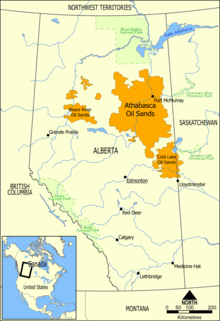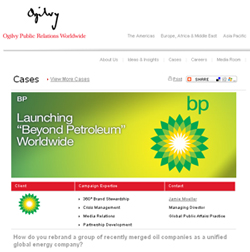In 2000, BP hired one of the world's most esteemed PR firms, Ogilvy & Mather, to create a global brand transformation. The slogan, "Beyond Petroleum" was created to show that BP transcended the oil sector by being innovative, progressive and environmentally responsible.
The company abandoned its 70-year old shield-style logo to a new cheerful, green sunburst.
The green was retained and the new logo propelled BP's relationship with nature a step further.
To many, the new image and message was a huge contradiction since BP's investment in renewable energy paled in comparison to what BP spent in extractive oil. So in a sense, many people felt that BP had changed its image but not its stance in being more environmentally friendly.
The green was retained and the new logo propelled BP's relationship with nature a step further.
To many, the new image and message was a huge contradiction since BP's investment in renewable energy paled in comparison to what BP spent in extractive oil. So in a sense, many people felt that BP had changed its image but not its stance in being more environmentally friendly.
Social responsibility is an ethical ideology that both companies and private citizens should fully embrace. For example in my household, I am doing my best to conserve energy and water. I've upgraded my toilets with more water efficient models and I've shortened my showers by a minute or two. I've committed to take public transportation when possible (I just signed up for a year-contract with Zip Car), and to even ride my bike to school.
BP's focus on social responsibility was a brilliant strategy ushered by a very shrewd PR firm. Many would agree that it was commendable and definitely fashionable for BP to accept global warming as a reality. But were they merely empty words with no substance.
Meanwhile ExxonMobil which until 2010 had committed the largest oil spill in the US, did not attempt to paint themselves green.
Instead ExxonMobil did the right thing. In 2009, ExxonMobil announced that they would invest $600 million into algae farms that would turn sunlight into automotive fuel. ExxonMobil is also building the world's largest plants to make liquefied natural gas, which releases 25% less CO2 than fossil fuels.
Meanwhile ExxonMobil which until 2010 had committed the largest oil spill in the US, did not attempt to paint themselves green.
Instead ExxonMobil did the right thing. In 2009, ExxonMobil announced that they would invest $600 million into algae farms that would turn sunlight into automotive fuel. ExxonMobil is also building the world's largest plants to make liquefied natural gas, which releases 25% less CO2 than fossil fuels.
Deep Horizon was not the first incident
In 2005, a major explosion destroyed a gasoline-filled tower at BP's Texas City refinery. Investigations showed that BP had ignored its own safety protocol. In 2006, BP also experienced a 4,800 barrel oil spill in Prudhoe Bay, Alaska. Investigations showed that the pipeline was corroded and leaking for many years because nobody was inspecting it.
Despite its history of accidents and environmental disasters, BP is still trying to tout its environmental image. More than any other oil company, BP tried selling itself as an environmental leader. Yet, they made little progress in adopting renewable energy and was derelict in preventing the spill
Despite its history of accidents and environmental disasters, BP is still trying to tout its environmental image. More than any other oil company, BP tried selling itself as an environmental leader. Yet, they made little progress in adopting renewable energy and was derelict in preventing the spill
However, while BP was polishing their philanthropic image, they
were not becoming a better gas company.
They were being negligent because they cared less for safety and more for their bottom line.
were not becoming a better gas company.
They were being negligent because they cared less for safety and more for their bottom line.
If BP had just reallocated some of their funds that they frittered away on marketing towards safety and quality assurance then perhaps their corporate social image would be a lot greener today than it was after the historic oil spill in 2010.
Greenwashing is when a company spends more money and time talking about being green than actually doing it.
Was BP guilty of greenwashing? Perhaps their motives for their environmentally sensitive rebranding was genuine. Though the marketeers did not wrong and their rebranding was simply ingenious. Their corporate leadership did not live up to their hype.
If BP was truly environmentally conscious, they wouldn't have skimped on proper testing, back-up procedures and thorough inspections.
If BP was truly environmentally conscious, they wouldn't have skimped on proper testing, back-up procedures and thorough inspections.
BP's advertisement budget during the spill neared 100 million. Their goal was to inform Gulf coast residents and the rest of the US about the progress of the recovery effort. By now, BP's disingenuous advertisement that they are developing low-carbon, renewable energy sources seem to be falling on calloused ears.
Shell Oil
Shell Oil has created this misleading ad.
The company is being accused of wildly exaggerating its environmental policies.
The ad that shows a human brain full of alternative and renewable fuel energy sources. However, contrary to the message inferred, Shell Oil has been regressing in the arena of clean energy.
 |
| Wikipedia: Oil Sands |
The Advertising Standards Authority said that Shell should not have used the word "sustainable" for its tar sands project.
The exploitation of the tar sands is an huge environmental scandal which causes massive pollution. This type of unconventional petroleum deposit is a mixture of sand, clay, water and a dense viscous form of petroleum referred to as bitumen (colloquially called tar).
Oil sands has recently been considered as a last resort as higher oil prices and new technology have made this option more profitable.







